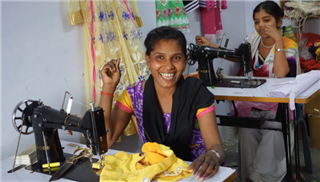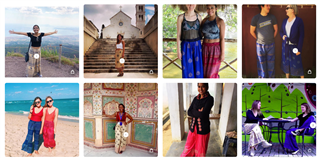For years now, major clothing manufacturers and retailers have been outsourcing production to regions with cheap labor and minimal labor laws, mainly in regions located within South America, Africa, and Asia. It seems like every year a new labor exploitation scandal is revealed, linking a huge retailer like U.S.-based Gap or Sweden’s H&M to worker abuse in factories and sweatshops. Shakti Apparel is working to provide not only fair wages and a safe working environment to employees, but to get work out into the rural villages of India. “I’m from a tiny country in South Asia called Bangladesh that is being exploited by fashion companies every day,” says Shafat Khan, Chief Marketing Officer and a co-founder of Shakti Apparel. “I grew up in the problem, I partook in the problem when I bought clothes produced in this messed up system, and then I finally said, ‘This is not okay.’”
Shakti Apparel’s origin loops back around to where it is today: in rural India. “I was not actually a part of the original team that first came up with this idea,” Shafat says with a sheepish grin. “Jane Hammaker, Malvika Jain, and Raghav Savara were the original creators, who came up with the concept for Shakti after working with the Mrida Group in India, a company that invests into development projects in rural villages.”
After returning to the University of Virginia, where every member, including Shafat, is a student in some capacity, the Shakti Apparel team decided to participate in the UVA Entrepreneurship Cup, colloquially known as the ECup: a competition for University of Virginia students to raise funding for their startup ideas at various stages of development.
“The ECup experience was amazing. It was the most rewarding thing for us,” Shafat recalls. “We practiced our pitch so many times that we all had each other’s parts memorized.”
“That was the day I think we realized, ‘Hey, we can build this, I think we can take this to the next level,’ and here we are,” Shafat summarizes.
Shafat describes Shakti Apparel as “a venture aiming to partner with stitching centers in rural villages of India to empower women and influence economic growth.” He hopes that Shakti can influence both the production side and the consumption side of the apparel supply chain, creating employment for women in rural areas of India while influencing the decisions of consumers when buying ethical apparel. Shafat sees a deep problem with the consumer mindset around purchasing clothing and the lack of thought that goes into the sourcing and creation of that clothing. “A lot of people have started caring more about what kind of food they’re eating, where it’s coming from, and what they’re putting in their body. So why don’t people care more about what they’re putting on their body?” Shafat asks. “The challenge is getting someone to buy ethically sourced products if customers can get the same products for half the price somewhere else, even though the former is doing a lot more work on ethically sourcing their products and other improvements in similar veins.”

“When someone walks into a clothing store, I want them to think, ‘Where are these from?’ and not just, ‘What’s the price?’” Shafat says passionately.
To address this disparity in price between ethically sourced products and “generic” brands, Shakti is pricing their palazzos, a style of loose-fitting and flowing pants that flare out dramatically at the legs, at $25, a price that stands out from the often prohibitively priced alternatives in the ethical apparel market.

While Shakti could easily have leveraged their mission and process to bump up their price, Shafat says doing that would defeat the purpose of the company. “The ultimate goal is to change the way people think about fashion,” Shafat says earnestly. “We want to be a company that changes how customers buy as well as the practices of other brands. Customers can change all they want, but if brands stick to having lower price points at the expense of their workers, then nothing is going to change.”
***
This summer, Shakti Apparel is participating in the iLab incubator program to advance their progress on a number of fronts, from building an e-commerce platform and accruing Instagram followers to growing the stitching center, becoming a zero waste company, and being able to provide more stitchers with access to education. Besides Shakti’s overarching main goals, though, Shafat says the iLab has already been invaluable. “Being in a space where you have 22 other ventures constantly working on their projects just innately motivates you, even if you’re not always directly working with them,” Shafat explains. “Looking at the progress other teams are making makes me think, ‘Shoot, now I need to make the same if not more progress than they are’… but that doesn’t mean you’re saying you don’t want other people to succeed. Healthy competition is amazing -- it’s like, ‘I want to win, but I want to win with everyone else doing all these awesome things.’ And none of that energy would have happened if the iLab wasn’t here,” he concludes.
Regarding the future of Shakti Apparel, Shafat continues his trend of giving nontraditional answers. “In 10 years, we would like to change mindsets,” he states. “When most companies think about 10-year plans, they think about profit, revenue, or investors. Well, our goal is to change mindsets.”
“I don’t care as much if we make a profit,” Shafat continues. “I don’t care as much if we venture off into the nonprofit side of things and change our model. What we want to do is create jobs and opportunities for the people we work with.”
As Shakti Apparel is pushing its plans forward this summer, Shafat and the rest of the team are primed and ready to keep running to the finish line, wherever that may be. As Shafat put it, “If you’re content with the way things are, that’s not going to help motivate you to get from point A to point B faster and better. And entrepreneurship is a race.”

***
To find out more about how Shakti Apparel is moving from point A to point B faster and better, you can find their online store and story at www.shaktiintl.org, or sign up for their newsletter at the bottom of this section of their website.
***
About The Team
 Jane Hammaker is a candidate for a Master of Public Policy degree at the University of Virginia, having just received her B.A. in Economics and Foreign Affairs in 2018. She is currently interning with the United Nations under ESCAP, the UN Economic and Social Commission for Asia and the Pacific alongside working effortlessly on Shakti.
Jane Hammaker is a candidate for a Master of Public Policy degree at the University of Virginia, having just received her B.A. in Economics and Foreign Affairs in 2018. She is currently interning with the United Nations under ESCAP, the UN Economic and Social Commission for Asia and the Pacific alongside working effortlessly on Shakti.

Shafat Khan is a 4th-year international student from Dhaka, Bangladesh. He is an Economics and Social Entrepreneurship student at the University of Virginia and is taking a year-long leave of absence during the 2018-19 school year to continue working on Shakti Apparel. Shafat has led the HackCville social entrepreneurship program, alongside working in sales and marketing roles over the past 4 years.
 Malvika Jain is a rising 4th-year international student from Calcutta, India studying in the McIntire School of Commerce at the University of Virginia. She previously created a startup named B-Bling, a jewelry venture that yielded 120% growth over the initial investment that was donated entirely to charitable causes. Malvika has also interned at Spectra Fashions, as well as doing ongoing volunteering as an ESL tutor with the International Rescue Committee to help Syrian refugee families in the Charlottesville area learn English.
Malvika Jain is a rising 4th-year international student from Calcutta, India studying in the McIntire School of Commerce at the University of Virginia. She previously created a startup named B-Bling, a jewelry venture that yielded 120% growth over the initial investment that was donated entirely to charitable causes. Malvika has also interned at Spectra Fashions, as well as doing ongoing volunteering as an ESL tutor with the International Rescue Committee to help Syrian refugee families in the Charlottesville area learn English.
 Raghav Savara is a rising 3rd-year international student from Lagos, Nigeria at the University of Virginia, pursuing a Bachelor’s Degree in Commerce. He has previously worked with the Mrida Group in India and as a financial consultant with the Student Entrepreneurs for Economic Development (SEED) organization. He also placed 4th out of 24 teams in the National Team Selling Competition, a business case competition. In addition to his work with Shakti, Raghav is currently working for Bain & Co. in South Africa as well being the operations officer of the Solar Car Team at UVA.
Raghav Savara is a rising 3rd-year international student from Lagos, Nigeria at the University of Virginia, pursuing a Bachelor’s Degree in Commerce. He has previously worked with the Mrida Group in India and as a financial consultant with the Student Entrepreneurs for Economic Development (SEED) organization. He also placed 4th out of 24 teams in the National Team Selling Competition, a business case competition. In addition to his work with Shakti, Raghav is currently working for Bain & Co. in South Africa as well being the operations officer of the Solar Car Team at UVA.
Update: This article was updated at 9:35 AM, July 12th, 2018, with photos. All photos in this article were provided by Shakti Apparel.
